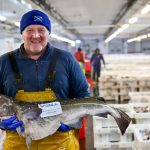The Scottish Fishermen’s Federation is underlining that good progress is being made in the recovery of fish stocks and that public opinion should not be swayed by “doom mongers” who continually talk down the state of fish stocks by using “worst case statistics”.
Speaking before the WWF “More Fish in the Sea” event at the Scottish Parliament on Thursday 10 November, which the Federation is supporting, Bertie Armstrong, the chief executive of the SFF said: “I am glad to represent the Scottish Fishing industry at this event, and we certainly share the aim suggested by the title. It will also be fantastic to see leading chef Tom Kitchin attending the event who like the fishing industry shares a deep personal connection for the need for sustainable seafood and the importance of supporting sustainable fisheries to provide an important and healthy food source.
“But there is much more to it than that. Thanks to innovation, commitment and real grinding sacrifice from the Scottish industry amongst others, remarkably good progress in the right direction has hallmarked the condition of our main target stocks over the decade since the last CFP reform.
“However, the public have not been trusted with a balanced message, receiving instead a diet of excessive gloom using generalised global worst-case statistics. This will serve only to paralyse people’s opinions and generate an unwarranted presumption against fishing. Instead, we should celebrate success and redouble our joint efforts to get the present reform of the Common Fisheries Policy to deliver the means of continued progress.
“There is certainly work still to be done, but it will be best provided by this reform delegating management to where it will be most effective – here at the regional level. At a major conference in London last week attended by EC Fisheries Commissioner Maria Damanaki and a selection of world class fisheries scientists, eminent scientist Professor Ray Hilborn of Washington University noted that there was a greater availability of fish for human consumption than was generally supposed and for a lot of fisheries yield could actually be increased.”
The main thrust of Hilborn’s contribution at the London conference on 31 October ‘New Challenges & Opportunities Facing Marine Science’ was to pick up on the point made by other speakers on how to feed an expanding world population that is predicted to exceed 9 billion people by 2050 (the conference was held on the actual day that the population was expected to hit the 7 billion mark.)
Mr Armstrong added: “There had been a projection in 1998, based on the trophic level of landings, that all large fish used for direct human consumption would have disappeared by 2048. However, a re-analysis of the data showed that the trophic level of catches was actually increasing.”








